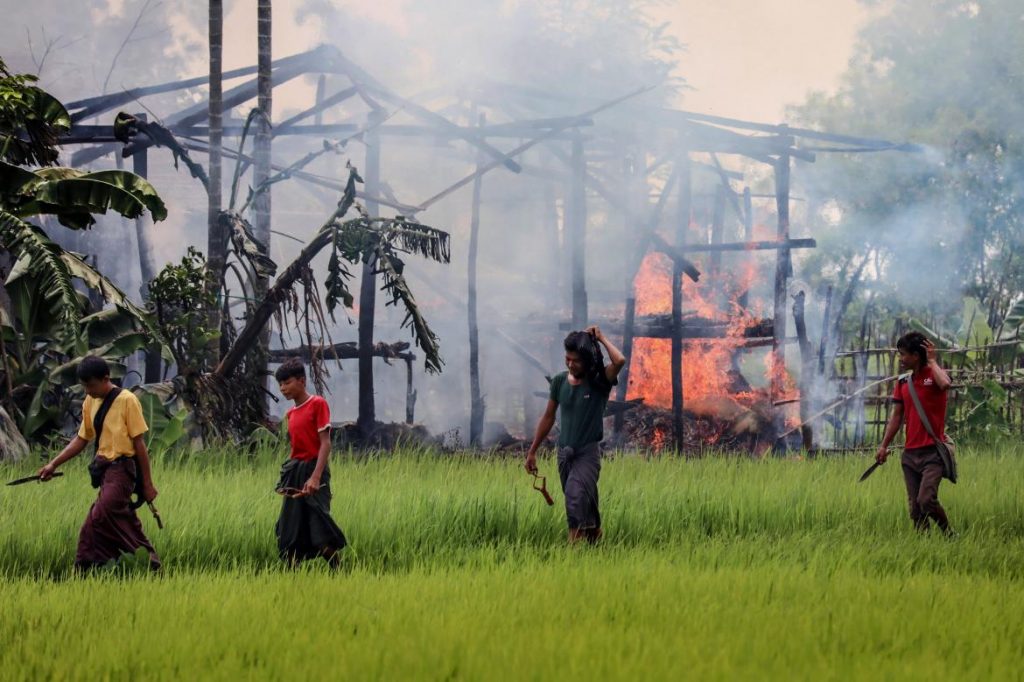The government must lift the ban on media access and ensure that the repatriation of refugees is acceptable to the international community.
By SITHU AUNG MYINT | FRONTIER
WHEN THE National League for Democracy government took office in March 2016, there was intense interest in its plans for developing the economy.
State Counsellor Daw Aung San Suu Kyi decided that economic development depended on ending decades of civil war and made the pursuit of peace the government’s top priority, a cause to which she has devoted much time and energy.
The NLD government’s efforts to attract foreign investment, which included legislative reforms, received a boost when the United States lifted all remaining economic sanctions against Myanmar in September 2016. The next month, the Arakan Rohingya Salvation Army launched the first of a coordinated series of attacks on security posts in northern Rakhine State.
They were followed by another series of attacks last August, which led to a massive military counter-insurgency operation that triggered the exodus of more than 688,000 Muslims to neighbouring Bangladesh. Many Myanmar initially believed that conflict and violence in a remote corner of the country was unlikely to have a negative impact on economic development, but it is now clear they were wrong. This week I’d like to discuss the adverse effects of the Rakhine crisis on the economy.
Support more independent journalism like this. Sign up to be a Frontier member.
In a shock decision on February 1, Herzfeld Rubin Meyer & Rose, the Myanmar affiliate of a New York-based law firm, announced that it was closing its Yangon office at the end of the month. In 2013, it became the first American law firm to open for business in Myanmar amid the high expectations for economic growth fuelled by foreign investment after the country began its transition to democracy in 2011.
HRMR’s lead director, Mr Eric Rose, was quoted as saying there were three main reasons that influenced the decision to close shop in Myanmar. In lengthy interviews with Asia Times and Myanmar Times, he cited government inaction on the economy, the Rakhine crisis, and remaining US financial sanctions together with the suspension of the European Union-Myanmar investment protection agreement.
It is clear that economic development has been adversely affected by the situation in Rakhine. Rose said the Rakhine crisis, particularly the flight of more than 750,000 refugees, had created a reputational risk that deterred Western companies from investing in Myanmar. The risk was “in particular due to the lack of a coherent response from the Myanmar government” to the situation in Rakhine, he told Myanmar Times.
The Rakhine crisis is not only a border problem, a religious and ethnic problem, a human rights problem and a sovereignty problem, but a problem that is directly related to economic development. That it was a factor in the decision to close the Herzfeld Rubin Meyer & Rose office after five years is an indication of the importance of solving the Rakhine problem.
What needs to be done to address the problem that has attracted intense domestic and international interest?
Media coverage of the violence in northern Rakhine after the August attacks last year has had a negative effect on Myanmar’s international image. It has included accounts of atrocities against Muslims and the burning of their homes to drive them out of the country.
Initially, the government and the Tatmadaw denied allegations of human rights abuses during the counter-insurgency operation. Then news emerged of the massacre at Inn Din village in Maungdaw Township on September 2 last year. An exhaustive account of the Inn Din massacre published by Reuters on February 8 included interviews with Buddhist villagers who admitted torching Muslim homes, burying bodies and killing Muslims.
The report also included the accounts by security personnel of their role in an operation to drive Muslims from the village. Reuters said it was the first time soldiers and paramilitary police were implicated by testimony from other security personnel.
A week before the Reuters investigation was published, Associated Press reported that there were at least five mass graves containing the bodies of Muslims at Gu Dar Pyin village in Buthidaung Township. The report said that before victims were thrown into mass graves, acid was poured on their faces to prevent them from being identified.
On February 2, the government denied the report, saying a clash at the village on August 27 last year had resulted in the deaths of 19 “terrorists” who had been “carefully buried” by the security forces. The Rakhine State government threatened to sue AP, which said it stood by its reporting.
On media coverage, there is only one way forward. The ban on media access to northern Rakhine must be lifted so that the international community may learn the truth about what happened during the counter-insurgency operation launched after the August 25 attacks.
The Annan commission on Rakhine recommended “full and regular” media access, saying that the ban was counterproductive. Media access has also been urged by former Thai foreign minister, Mr Surakiart Sathirathai, who heads a board appointed by the government to advise the committee formed to implement the Annan commission recommendations.
Another important issue is the repatriation and resettlement of refugees, which must be accomplished successfully, no matter how many difficulties need to be overcome. Muslims should be resettled where they had lived before they fled Myanmar and be able to live without fear.
The repatriation process must be conducted in a way that is acceptable to the international community. Otherwise, the Rakhine problem will continue to hinder economic development in Myanmar.







